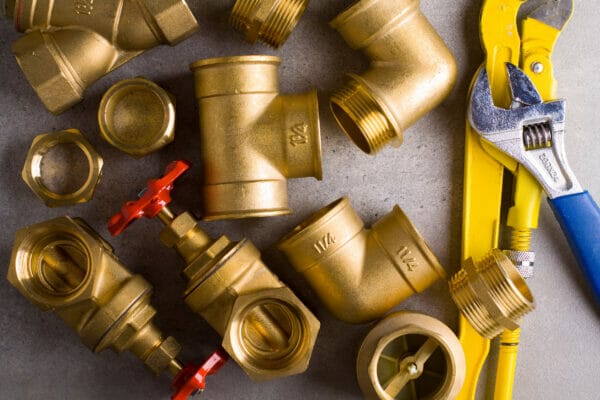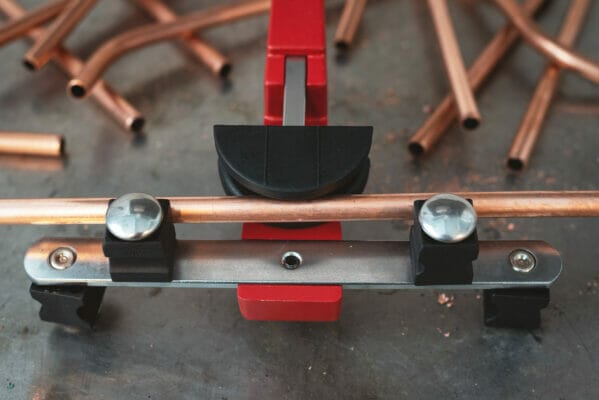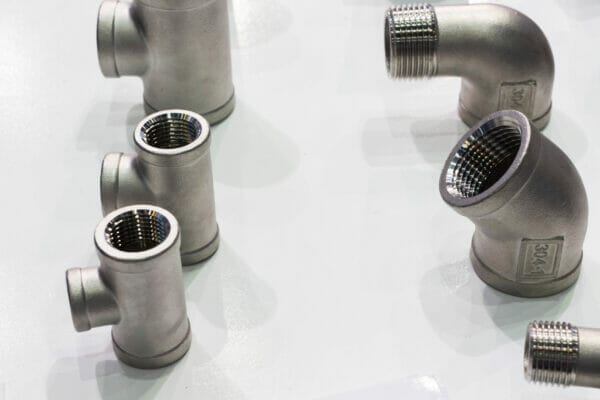Disclaimer: This post may contain affiliate links, meaning we get a small commission if you make a purchase through our links, at no cost to you. For more information, please visit our Disclaimer Page.
For residential purposes, brass pipes are generally more beneficial than galvanized pipes to supply water. Brass is highly resistant to corrosion and has a longer life span. Conversely, galvanized steel can discolor the water or contaminate it with lead. So, brass is often the better choice.

Table of Contents
Is Brass Good for Water Lines?
Brass is an alloy or mixture of copper and zinc, with copper being the major component most of the time. But the ratio of the two metals can vary, which gives them varying mechanical and chemical properties. It is also a popular choice for making various fittings and pipes for plumbing.
People have been utilizing brass for a long time, even before copper pipes became standard. And there are good reasons for this.
Durable and Corrosion Resistant
Brass is well known for being very durable and corrosion-resistant. Despite being a copper derivative, brass is, in fact, more durable than copper.
It does not contain any iron, so it does not rust when exposed to air or moisture. Rust is the most common cause of metal pipe corrosion. So, brass is well protected from it.
Depending on the specific chemical construct, brass can be even more durable. For example, adding a little aluminum to the mixture can significantly enhance the anti-corrosion properties of brass.
Of course, brass is plenty tough with just copper and zinc. Brass pipes do not rust on the interior. So, there is minimal risk of leaks forming in the pipeline. The copper content in brass pipes can be anywhere between 66-85%.
The higher the copper amount, the better the pipe tends to be. So, red brass, which has a high amount of copper, is often regarded as the best choice.

Safe Choice for Water Lines
Brass pipes do not have friction loss nor do they discolor the water. This is especially relevant for plumbing that supplies potable or drinking water. Discolored water is more than enough to dissuade people from using it.
One factor you have to consider when using metal pipes is contamination. And not just bacterial contamination. Metal can mix with the water due to the constant flow. And if the pipe contains metals such as lead or chromium, this poses a massive threat to your wellbeing.
Fortunately, the laws for regulating the usage of lead have become stricter and the brass used in water lines do not contain any.
So, the risk of contamination is low. Also, brass is a not suitable place for the growth of germs either. Just make sure that the brass pipe you are buying only contains copper and zinc.
Heat Resistant
Additionally, brass is heat resistant, more than copper. This makes brass pipes suitable for supplying hot water from tanks or for hot water lines in the shower.
Longer Life Span
Another advantage brass has over galvanized steel is longevity. In fact, brass can outlive most of the plumbing materials you can find out there. Solid brass pipes can last you more than 80 years.
This is why you will many old homes with brass plumbing that are still capable of giving good service.
Tight Seal
Brass pipes are easier to thread than steel. Plus, brass threads are softer than most metals. Meaning they allow you to make a tight seal.
The disadvantage of Using Brass
The main point of concern is whether the pipe contains any traces of lead. Even a small amount of lead can become lethal.
So, make sure that the pipe you are using does not have any sort of lead or similar trace elements in it.
Also, metal pipes may not be the ideal fit for every type of home. So, consult with your engineers or an expert to figure if brass pipes are suited to your home.

Are Galvanized Fittings OK for Drinking Water?
Galvanized pipes and fittings are made of steel that has been given a zinc coating. This coating gives it protection from the corrosive effect of the water and makes it long-lasting.
Galvanized pipes and fittings were the standards in plumbing several years ago, before copper and other materials took over. This is because galvanized steel poses some potential health risks.
Potential Hazard
The zinc used to coat the steel in the galvanization process is not always one hundred percent pure. Metals such as lead and cadmium may get mixed in the process.
Over time, the lead can bleed into the water supply, particularly if the pipe experiences corrosion. And lead is obviously a major health hazard for humans and animals.
This becomes a great source of concern if the galvanized products are being used to transport potable water. If the pipe does start to rust and the lead leaks out of it, an entire household can succumb to lead poisoning.
Rust Formation
This happens often if the diameter of the pipe or fitting is small. Rust can build up on the inside, eventually leading to leaks. The rust can dissolve in the water, leading to discoloration.
Shorter Life Span
Compared to copper or brass, the average life span of galvanized steel is very low. They can last you for 40 to 50 years, whereas brass can remain sturdy for twice that time.
What Can You Use Galvanized Steel For?
So, for a multitude of reasons listed above, galvanized steel has ceased to be the standard in plumbing today. Drinking water supplies almost exclusively utilize PVC, brass, or PEX pipes and fittings.
However, galvanized pipes still manage to find some sort of use in residential or commercial establishments.
In most cases, this material is used to transport non-potable water lines and greywater. Since the water in these pipes will not normally enter our bodies, the potential lead contamination is not as big of an issue.
Is It Okay to Use Brass Fittings with Galvanized Pipes?
While you will not find many modern homes with galvanized pipes and fittings, many homes built before the sixties will still feature such plumbing.
If the pipes are still functional, you may need to only repair some parts without having to replace them.
In the case of using different types of metal in the same system, one has to consider the risk of galvanic corrosion. This is why stainless steel and copper do not work together, as they will react with and corrode each other.
But brass does not have this problem as it is not purely copper. So, brass fittings can be used with galvanized pipes, though you probably should consult an expert before doing so.
Conclusion
The plumbing system is like the blood supply of the house. If it is not set up properly, your entire house may need major remodeling, which is a consequence no homeowner wants.
